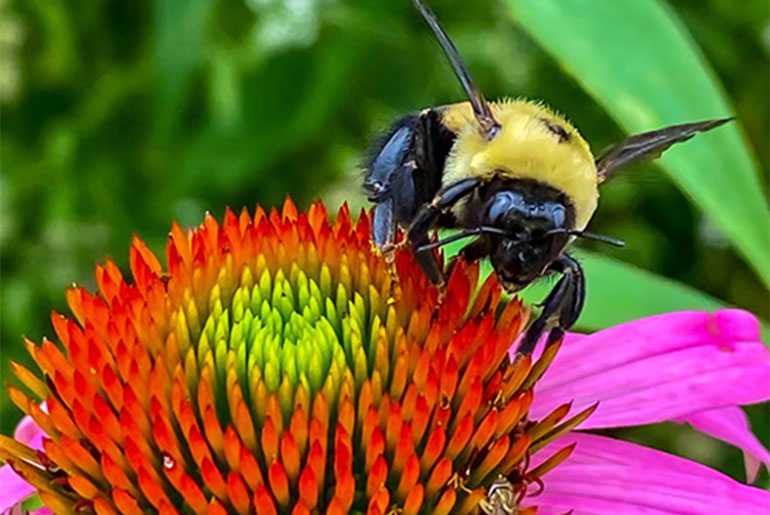The information presented on this page may be dated. It may refer to situations which have changed or people who are no longer affiliated with the university. It is archived as part of Mississippi State University's history.
Mississippi State abuzz as a Bee Campus USA
Author: Karen Brasher

A bumblebee sits atop a coneflower at the Clay Lyle Entomology Building on the MSU campus. (Photo by David Ammon)
The current buzz around Mississippi State's campus is its new affiliation as a Bee Campus USA, a designation of the Xerces Society.
The university joins 122 campus affiliates across 44 states recognized for benefiting pollinators. The MSU Bee Campus committee, consisting of faculty and staff in the College of Forest Resources and College of Agriculture and Life Sciences, led the effort. Wes Burger, interim dean of the College of Forest Resources, spoke to the importance of protecting pollinators.
"We are proud to receive this designation. It is the result of dedication by our faculty, staff and students to protect and enhance pollinators and habitat across our campus and research farms," Burger said. "Pollinators are vital to our environment, benefiting 35 percent of global food production or one in every three bites of food we consume, and pollinating approximately 90 percent of flowering plants."
Despite their importance, pollinator species face population declines. Bees, butterflies, moths, beetles, flies, hummingbirds and other species are dwindling, primarily due to loss of native plants and habitat, among other factors.
To combat this decline, the campus committee established pollinator habitat over the last several years. Native plantings have been installed at the Clay-Lyle Entomology building, the R. R. Foil Plant Science Research Center, and the Wildlife and Fisheries Research and Educational Center, among other sites on campus.
Future plans for the MSU Bee Campus include development of an integrated pest management plan for future pollinator plantings, educational events and student service-learning projects.
"We are excited about the opportunity to inform and engage our community in understanding the role pollinators play in food production," Burger said. "The formation of this committee and the designation of Bee Campus USA consolidates all of our pollinator activities to educate the public about their importance."
Bee City USA and Bee Campus USA are initiatives of the Xerces Society for Invertebrate Conservation, a nonprofit organization based in Portland, Oregon, with offices across the country. Bee City USA's mission is to galvanize communities and campuses to sustain pollinators by providing them with healthy habitat, rich in a variety of native plants and free of pesticides.
"The program aspires to make people more pollinator conscious," said Scott Hoffman Black, Xerces' executive director. "If lots of individuals and communities begin planting native, pesticide-free flowering trees, shrubs and perennials, it will help to sustain many, many species of pollinators."
For more information about Bee Campus USA, visit https://www.beecityusa.org. For information on MSU's College of Forest Resources, visit https://www.cfr.msstate.edu, on the university's College of Agriculture and Life Sciences, visit https://www.cals.msstate.edu.
Date: 2021-06-22




